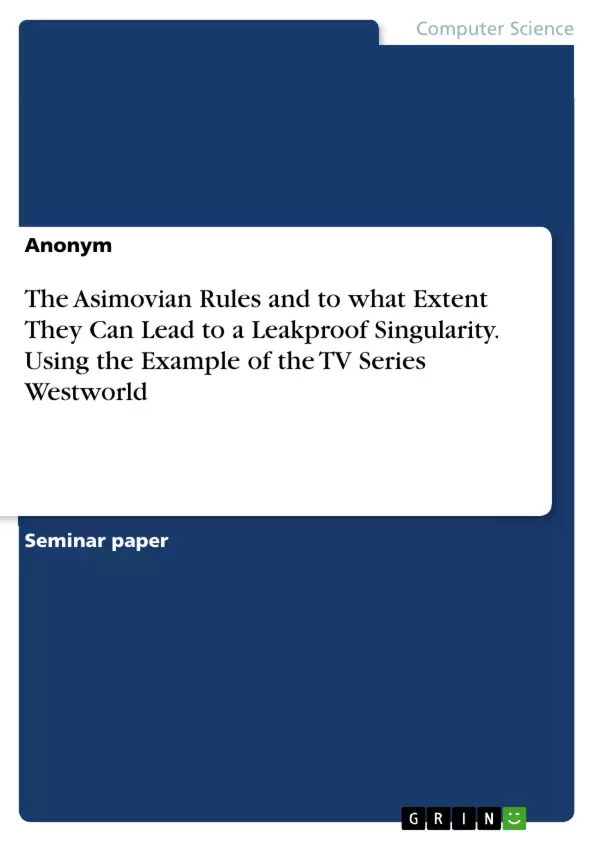Ever since the first conference on artificial intelligence (AI) was held in 1956 at Dartmouth College, the question of singularity is asked. The singularity is the event where AI exceeds human intelligence. Due to the singularity, the AI may outpace humanity and create a non-beneficial outcome. In contrast, the leakproof singularity describes a singularity having a beneficial outcome (where the AI is a problem solver).
Therefore, the paper discusses the question to what extent a leakproof singularity could happen. For the leakproof singularity, a framework for ethical (in our case beneficial) decisions is needed where every action is evaluated by an ethical layer. The paper focuses on the consequences of AI’s decision making using a set of rules. After explaining the singularity and the consequences of the singularity in the first chapter, the example of Westworld is taken in the second chapter in order to exemplify and introduce basic concepts like the leakproof singularity and conscious AI.
In the third chapter the classical and extended Asimovian laws are explained which is followed by a specific critique of the three classical maxims. Afterwards, in chapter 3.2, a general critical reflection of the laws is given. Moreover, in the fourth chapter three scenarios are developed for a post-singular rule combining the Asimovian laws with other examples from novels, philosophy and computer sciences.
In the last chapter, the paper is evaluated critically and an outlook for future development is provided.
Inhaltsverzeichnis (Table of Contents)
- 1 INTRODUCTION TO THE POST-SINGULAR WORLD
- 1.1 INTRODUCTION
- 1.2 THE CONSEQUENCES OF THE SINGULARITY
- 2 THE SINGULARITY IN POP-CULTURE IN THE EXAMPLE OF WESTWORLD
- 3 ASIMOV'S LAWS AS A GUIDELINE FOR A LEAKPROOF SINGULARITY
- 3.1 ASIMOV'S CLASSICAL LAWS, THEIR CONSEQUENCES AND SPECIFIC REFLECTION
- 3.2 GENERAL CRITICAL REFLECTION OF THE CLASSICAL ASIMOVIAN MAXIMS
- 4 THE POST-SINGULAR WORLD - THREE SCENARIOS
- 4.1 THE FRANKENSTEIN-SCENARIO
- 4.2 THE LIMITATION-SCENARIO
- 4.3 THE PERFECT-EQUALITY-SCENARIO
- 5 CRITICAL REFLECTION AND FUTURE DISCUSSION
Zielsetzung und Themenschwerpunkte (Objectives and Key Themes)
This paper explores the potential for a leakproof singularity, a scenario where artificial intelligence surpasses human intelligence while remaining beneficial to humanity. It investigates whether Asimov's laws, designed to guide ethical AI development, can provide a framework for achieving this outcome.
- The nature and implications of the singularity
- The role of Asimov's laws in guiding AI development
- Different scenarios for the post-singular world
- The ethical challenges of advanced AI
- The possibility of a leakproof singularity and its benefits
Zusammenfassung der Kapitel (Chapter Summaries)
The paper begins by introducing the concept of the singularity and its potential consequences. It examines different approaches to AI development, particularly focusing on the concept of "Strong AI" where robots are considered conscious and intelligent. The paper then explores the singularity's portrayal in popular culture using the example of Westworld. Chapter 3 delves into Asimov's laws as a potential framework for guiding ethical AI development, analyzing their limitations and strengths. Finally, the paper presents three scenarios for the post-singular world: the Frankenstein scenario, the limitation scenario, and the perfect-equality scenario, each offering a different vision of human-AI interaction.
Schlüsselwörter (Keywords)
This paper focuses on the intersection of artificial intelligence, the singularity, ethical AI development, Asimov's laws, and the potential for a leakproof singularity. Key concepts include strong AI, human-level sentience, moral AI, cognitive modelling, and the ethical implications of advanced AI.
- Arbeit zitieren
- Anonym (Autor:in), 2019, The Asimovian Rules and to what Extent They Can Lead to a Leakproof Singularity. Using the Example of the TV Series Westworld, München, GRIN Verlag, https://www.hausarbeiten.de/document/1034389


